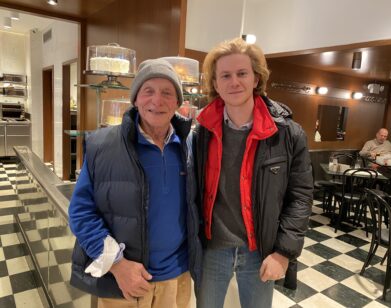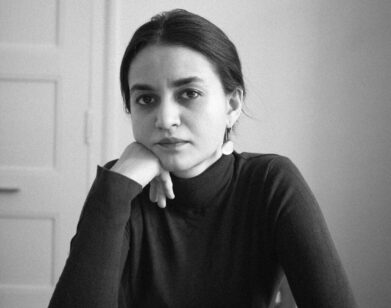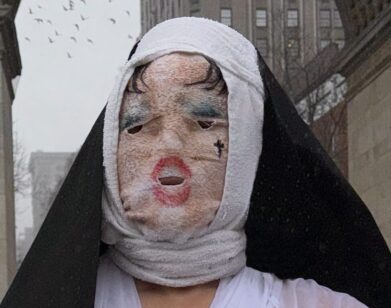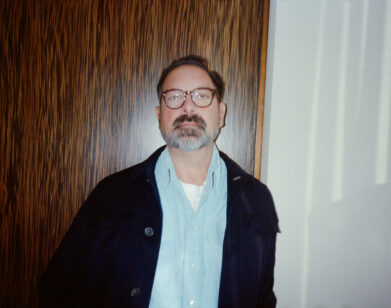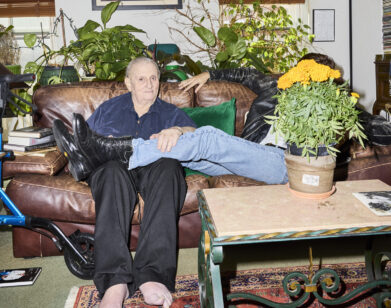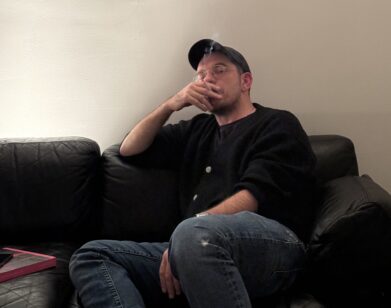Stranger to Stranger: Dan Savage
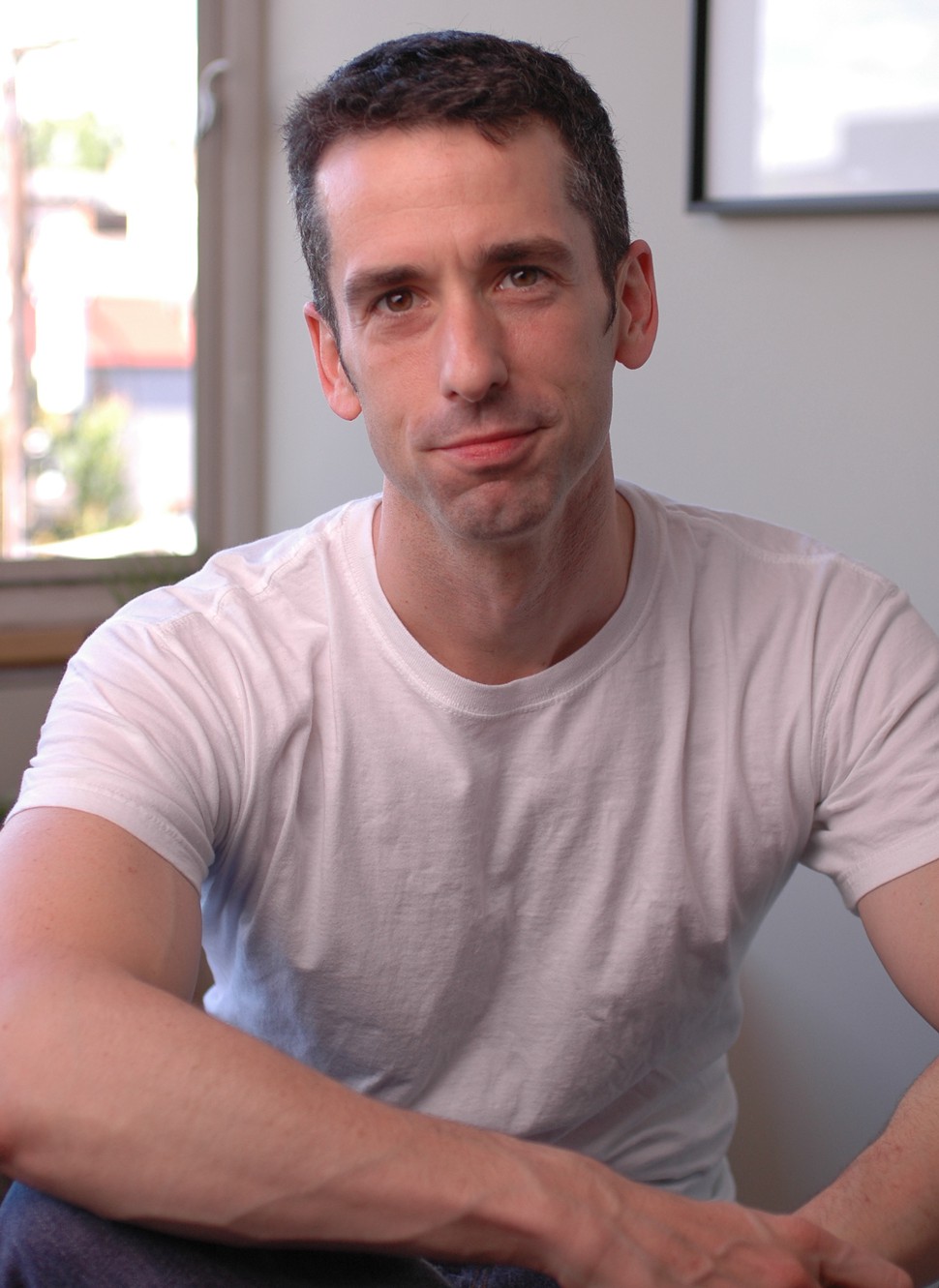
Of all the people who work at The Stranger, Dan Savage has the best story about Auschwitz. “Best” meaning most perversely comic. “Oh, I have the best story about Auschwitz!” he said, slapping the table during after-work drinks one night at Barca, a bar across the street from the Seattle offices of The Stranger. Half a dozen Stranger writers were sitting around trying to think of the worst possible restaurant name and someone said “Auschwitz.” Then Savage recalled the time he visited Auschwitz in the 1980s and, feeling hungry and feeling guilty about feeling hungry, went into the concentration camp’s café, a drab room with somber-faced employees spreading butter on plain bread. There was German radio playing on the boombox, and the song that came on the radio as he stood there was “Don’t Worry, Be Happy.”
Savage knows a lot about Germany. He loves The Rise and Fall of the Third Reich, Macbeth, Sweeney Todd, and anything involving beheadings. If you have some terrifying story, he has a more terrifying story. If you bring up Jeffrey Dahmer, he will tell you about the guy he knew whom Dahmer ate. He was a Catholic altar boy and has the jokes to prove it, although these days, he’s more known for his anti-bullying crusade than for jokes about the Crusades. He and his husband Terry Miller founded the It Gets Better Project in 2010, a YouTube ecosystem of first-person testimonials that became a whole lot more than queers talking to queers when Hillary Clinton, Barack Obama, and a bunch of sports teams made videos, too. “You gotta give ’em hope,” Savage always says, because Harvey Milk always said it.
In 2007, after seven years, Savage stepped down as editor of The Stranger—a job I now hold—to pursue television projects. He continues to be the paper’s editorial director (and owns a slice of it); he blogs so much, it seems like a condition; and every week he still writes a hilarious and much-needed column called Savage Love, which has been keeping STIs out of young people’s pants since 1991. The column has already been adapted into a podcast, called the Savage Lovecast, and tonight at 10 pm, the TV adaptation of it airs on MTV. It’s called Savage U, and it documents his travels on college campuses, giving advice about sex to the Americans who are having it the most. Last week, I met up with Savage in a booth at Linda’s Tavern, four blocks from The Stranger‘s office.
CHRISTOPHER FRIZZELLE: You’re a pot-smoking, antisocial potty mouth who publicly made fun of Kurt Cobain the day he died and supported the Iraq War. And now you’re a role model or something?
DAN SAVAGE: Aw, fuck you, man. [laughs] That’s all this role model has to say: “Fuck you.”
FRIZZELLE: With It Gets Better, you’ve become the face of gay empowerment—you could even say pride. But in your book 2003 book Slouching Towards Gomorrah, you’re hanging out with a friend in LA and you’re like, “Why do you go to Pride? What’s the point of Pride anymore?” And he’s like, “Because of the youth.” And you’re like, “Whatever, blah blah, the youth.” That doesn’t seem to be your line anymore.
SAVAGE: No, it isn’t my line anymore. What Billy Lucas’s and Justin Aaberg’s suicides really opened my eyes to was that it had gotten worse in schools. It had gotten worse in exurbs and mega-churches for LGBT kids. The successes of the LGBT civil rights movement and the more prominent role openly gay people are playing in the public eye has actually turned up the temperature in middle schools and high schools for queer kids. We’ve had a culture war roaring away, and the kinds of people who want to abuse and discriminate against gay people who are adults can’t really lay their hands on us unless they want to be gay-bashers and go to jail. They abuse us from afar and in the abstract, they abuse us with checkbooks and ballots, but their kids go to school on Monday morning. And there’s a gay kid. And they feel they have license to beat that gay kid up in a way that I don’t think they did when I was in school. I think it’s gotten worse.
FRIZZELLE: What was it like when you were in school?
SAVAGE: You could fly under the radar a little bit. You could be a weird kid without defaulting to gay, without everyone assuming you must be gay—that was literally the last place many people went. Sedaris, in his essay in the It Gets Better book, writes that when he was growing up nobody called him gay because you might as well have called him a warlock. Nobody knew what gay was. Now people know what gay is. It really did take Billy Lucas’s suicide to wake me up to, kind of, the damage of the success of the LGBT civil-rights movement—higher-profile LGBT people—has done to LGBT youth who are trapped out there in those shitholes. But I don’t think we need Pride. I am still opposed, on philosophical grounds, to the flap of the rainbow windsock and the damage that does to us intellectually. Pride became this dogma which meant you couldn’t criticize anything gay—if you were the least bit critical of gay culture or people or any gay person doing any gay thing, that was an insufficient display of pride. You were suffering from internalized homophobia. As opposed to external homophobia, like, “I think you’re fucked up. I’m fine. You’re a mess.” And that’s what bothered me—still bothers me—about Pride. To be gay is nothing to be proud of. It’s in how you are gay that you have something to be proud of, considering the obstacles placed in your path if you are gay.
FRIZZELLE: What’s TV land like?
SAVAGE: Ha ha. Well, Savage U really wasn’t in TV land. I did a pilot for HBO [several years ago] and that was much more like TV land. It was in LA, we were in a big studio. Savage U was just me doing my regular thing but with a camera crew following me around. [In a deep voice.] I am a job creator! I mean, I was doing the Q&As at colleges, I always do that. But I had camera people with me and a co-host named Lauren who’s really just there to interject, interrupt, and do organically what happens in the column and on the podcast, which is I say shit and people disagree and we get into an argument—in comments or in a follow-up column. You can’t do a follow-up TV show, so those sorts of little arguments have to happen in the moment.
FRIZZELLE: You write in one of your books that “good looking, rich, fit gay men fill [you] with envy.” Aren’t you a good-looking, rich, fit gay man?
SAVAGE: No, I’m not good looking. I’m very strange—a very bony face on an enormous skull, and I don’t like to be naked because I don’t like how I look naked. And—no, no. I own a lot of my house, because I’m Irish and from people who never owned anything. So I could have a lot more trappings of wealth if every time I had 20 extra dollars I didn’t pay off more of the mortgage. So I don’t feel particularly wealthy-but, you know, I pay my taxes and I know that I am. You see me. I’m bombing around town on my same shitty bike, in my same shitty clothes, in the same shitty t-shirts. There are gay men who want to be perceived as wealthy and successful and having all the trappings, and I just don’t give a shit about any of that stuff.
FRIZZELLE: What’s one thing you thought you knew about raising kids before having one that has turned out to be not true?
SAVAGE: TV commercials make parenting look like there are going to be good days and bad days—like, it’ll be this gentle wave, like you’ll have a blissed-out, really wonderful day or two, and then, you know, then you’ll have an issue. And what parenting is, is kind of… [He mimics a Richter scale with his finger.] It looks like an earthquake. There’s a good two minutes and then a bad three and a good 10 and a bad four—it’s just like [faster Richter scale] all day long, until the kid is asleep. Once they’re out of the doorstop phase, once they don’t stay where you left them, once they have agency and they can move from one place to another? And then once they can talk? I think we should cut their vocal cords and break their legs the minute they’re born, because it’s all downhill once they can talk and move.
FRIZZELLE: Did you ever have the urge as you were raising DJ to pretend to believe in God so that your child would feel like there was someone always watching him and there were rules he could never break?
SAVAGE: Yes. Yes. And my mother encouraged me to do that. We had Santa for nine wonderful years. And you can see the shit that God does to us. There was this moment when DJ was having a bad-behavior November and he was in the car and he just burst into tears and we were like, “What is wrong? What is wrong?” He was like, “I’m not going to get anything for Christmas, I’ve been so bad, Santa’s not going to bring me anything.” He was really tortured by the thought. And we’re like: Oh, this is awful, what we’ve done. So we tried to teach empathy without imaginary friends after that.
FRIZZELLE: Do you miss doing drag?
SAVAGE: No.
FRIZZELLE: Why not?
SAVAGE: I had a blast doing it. But it was really a disguise. I started doing drag in Seattle because I started doing my column before I moved here, and then moved here and wanted to be able to go out and do things as Dan Savage without being recognized the next day, because the column was just in Seattle and it was kind of a sensation and I was beating people up. I was really worried and I didn’t want to beat somebody up in a column and have that person know what I look like when I didn’t know what they looked like. So when I started doing public appearances I also really got into drag, and I loved doing it. It was really fun. Not all of us can pull it off forever like RuPaul. I was a good Barbie-doll, giant-dress drag queen, but I didn’t want to be a 35-year-old, 40-year-old, 45-year-old drag queen. I didn’t think I could pull it off. When I first moved to Seattle I weighed 158 pounds, 160 pounds, and I’d put on a waist cinch and was enormous and had big boobs.
FRIZZELLE: Tell readers what your name was.
SAVAGE: Helvetica Bold was my drag name. And I was Helvetica Bold before Helvetica was cool. Before the documentary, man.
FRIZZELLE: You said in your piece for This American Life about your mom dying that the virtue of Catholic rituals is they fill the emptiness. Is that mostly what the church is good for—theater?
SAVAGE: Oh, absolutely. The Catholic church is brilliant at theater. I wanted to be a priest when I was a kid. Then I realized I could do drag, live in big houses full of Catholic kitsch, and fuck boys without getting ordained and taking a vow of celibacy. And I think that kind of ritual is important, having some motions to go through. Jews do that so brilliantly. It was really my Jewish friends when I first moved to Seattle—Nancy and Abby—who convinced me that I could sort of reembrace some of the Catholic time-step stuff. Because most of the people I know who are Jews observe Jewish holidays and do Jewish rituals to affirm their cultural identity as Jews but they don’t believe in fucking anything. And they eat bacon. Well, I can do some Catholic shit and not believe in anything and eat dick. My Jewish friends pointed the way!
FRIZZELLE: Are you an atheist?
SAVAGE: I’m an agnosto-theist. I cross myself on airplanes. I pray when I’m sick. When you’re sick I’ll keep you in my thoughts; when I’m sick, I’m entreating a higher power.
FRIZZELLE: You’re going to actually make theater—not Catholic Church theater, but real theater—in Seattle this summer, at Intiman.
SAVAGE: Yeah.
FRIZZELLE: What are you doing?
SAVAGE: I’m doing a drag version of The Miracle Worker.
FRIZZELLE: Why would you do that?
SAVAGE: I would do that because there’s that scene in The Miracle Worker—”Yes, Helen, water. It has a name, Helen, water.” And it occurs to me that that scene could be improved upon if it was, “Yes, Helen, vodka. It has a name, Helen, vodka.” And it was Annie pouring vodka into Helen’s mouth and then tossing in an olive at the end and saying, “Martini, Helen—that has a name, too!” The way I always did theater was, I would think of a scene or a play that there’d be a moment I’d want to kind of fuck up and do differently, and then work backwards from there. So I’m taking that show and working backwards from, “Yes, Helen, vodka, Helen, it has a name, Helen, vodka.” Like, how does that happen? How do you get to “Yes, I want vodka?” Well, you put it in a gay bar, you make everyone a drag queen—a deaf, blind drag queen. It’s kind of hard for a deaf, blind drag queen to lip-synch. But we’re going to see what that looks like. I would like to say, by the way, that this show is going to be deeply offensive to the deaf/blind community, so please don’t tell them about it. They’ll never know if someone doesn’t tell them about it.
FRIZZELLE: Are you writing anything other than your column?
SAVAGE: I’m supposed to be writing a book the last two years. About sex, which is why it’s hard for me to write it. Because I just don’t feel like anybody gives a shit right now about what I have to say about sex, because what I’m going to say is, “Oh, yeah, sex, why don’t you have some? Sex! It’s a good thing! It’s—”
FRIZZELLE: It’s what’s for dinner!
SAVAGE: [laughs] Gonna steal that. “Dick. It’s what’s for dinner.” The beef council isn’t using it anymore. We might as well take it. Maybe that should be the new gay rallying cry instead of Pride. “Ass: It’s what’s for dinner.” “Dick: It’s what’s for dinner.” “Pussy: It’s what’s for dinner.” Works for all of us!
SAVAGE U PREMIERES TONIGHT AT 10 PM ON MTV.

